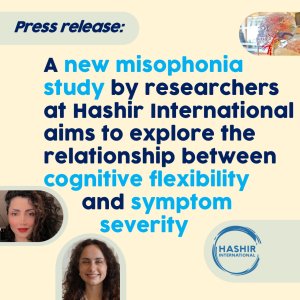Hashir International, a research institute and treatment centre, will be conducting a new study on misophonia, focusing on the link between affective flexibility, rumination, perseverative thinking, and misophonia symptoms and their severity.

Misophonia is a disorder characterized by an extreme, negative reaction to certain sounds, including chewing, eating, and, in some cases, the breathing sounds of other people. The emotional distress and negative effects caused by these sound triggers can profoundly impact the life of individuals suffering from misophonia.
Misophonia is surprisingly widespread and multifaceted. While several studies have examined various dimensions of this disorder, particularly its emotional aspects, the cognitive aspects have remained understudied.
Researchers at Hashir International will launch a new study to assess how affective flexibility, anger rumination, and perseverative thinking, which are the cognitive aspects of misophonia, relate to misophonia symptoms and their severity. The study will also explore if these aspects differ in people without misophonia. Affective flexibility, the brain ability to adapt to new events or change its way of thinking, may be hindered in people with misophonia, leading to difficulty shifting attention away from bothersome sounds. Additionally, individuals with misophonia may struggle to stop thinking about the triggering sounds, suggesting a potential connection between misophonia and rumination or repetitive thoughts about the triggers. These cognitive factors will be measured in participants, who will be recruited online.
The study will be conducted online, enabling researchers to include a large group of individuals both with and without misophonia. The online experiment will consist of several tests and tasks, each designed to measure affective inflexibility, rumination, and perseverative thinking.
By understanding the relationship between these cognitive aspects and misophonia, researchers aim to enhance their understanding of the disorder and develop effective treatments. Dr. Mercede Erfanian, PhD, is leading the study and believes that it is crucial in paving the way for more effective treatments: “Understanding the cognitive roots of misophonia may open the door to improved treatment strategies. For instance, cognitive-behavioral therapy (CBT) and interventions targeting affective flexibility could become valuable tools for managing misophonic reactions.”
This study is a collaborative effort between Hashir International and the University of California – Berkeley, with research student Vivien Black actively contributing to the study.
For further information, please contact:
Hashir International Institute, 1 Farnham Road, Guildford, Surrey, GU2 4RG, United Kingdom
info@hashirtinnitusclinic.com | +44(0)1483 362622
About Hashir International:
Hashir International is a leading research institute and treatment center dedicated to improving the diagnostic process and rehabilitation programs for patients experiencing misophonia, tinnitus, and hyperacusis. They offer specialist training courses, ethical review of research proposals, research design, research sponsorship, and supervision of MSc and PhD students.